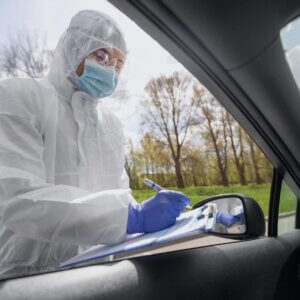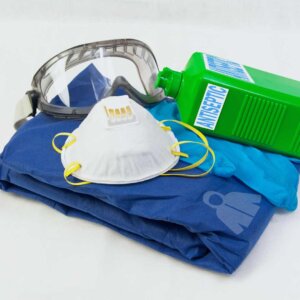Top 10 Frequently Asked Questions to Our Professional Forensic Cleaners
With more than 30 years of industry experience, AllAces Cleaning & Restoration can handle multiple aspects and job sizes relating to forensic cleaning services with our certified professional forensic cleaners. Our professional forensic cleaners work with empathy, discretion and professionalism when dealing with trauma and the aftermath of these challenging situations. Understanding the importance of professional forensic cleaners can be difficult, therefore we have compiled our top 10 frequently asked questions for your convenience.

Top 10 FAQs
1. What does a professional forensic cleaner do?
A professional forensic cleaner is responsible for cleaning and sanitising crime scenes, trauma scenes, or other locations that have been affected by biohazardous materials. Their main objective is to restore the area to a safe and habitable condition while minimising the risk of contamination and ensuring proper disposal of hazardous substances.
The tasks performed by professional forensic cleaners may include:
- Biohazard Remediation: Cleaning and removing blood, bodily fluids, tissue remnants, and other biohazardous materials from the scene.
- Sanitisation and disinfection: Thoroughly cleaning and disinfecting surfaces to eliminate any potential pathogens or contaminants.
- Odour removal: Using specialised equipment and techniques to eliminate unpleasant odours resulting from decomposition, blood, or other sources.
- Decontamination: Implementing stringent decontamination procedures to prevent the spread of infectious diseases or hazardous materials.
- Proper waste disposal: Adhering to local regulations and guidelines for the safe and legal disposal of biohazardous waste materials.
- Restoration and rebuilding: In some cases, professional forensic cleaners may coordinate with restoration professionals to repair or rebuild the affected area.
2. How are professional forensic cleaning services different from regular cleaning services?
- Nature of the work: Professional forensic cleaners focus on the cleanup and remediation of crime scenes, trauma scenes, and locations affected by biohazardous materials. This includes handling blood, bodily fluids, tissue remnants, and other potentially dangerous substances. Regular cleaning services, on the other hand, primarily deal with routine cleaning tasks such as dusting, mopping, and general tidying.
- Specialised training and knowledge: Professional forensic cleaners receive specialised training in biohazardous waste management, bloodborne pathogens, safety protocols, and proper decontamination techniques. They understand the legal and health risks associated with handling hazardous materials and adhere to strict industry standards. Regular cleaners typically do not undergo the same level of training or possess the specific knowledge required for handling biohazards.
- Compliance with regulations: Professional forensic cleaners are well-versed in local, state, and federal regulations governing the cleanup and disposal of biohazardous materials. They ensure compliance with these regulations to protect public health and the environment. Regular cleaners typically do not encounter biohazardous waste and may not be familiar with the specific regulations governing its handling.
- Equipment and specialised tools: Professional forensic cleaners use specialised equipment and tools designed for the safe and effective cleanup of crime scenes and biohazardous materials. This may include personal protective equipment (PPE), high-efficiency particulate air (HEPA) filters, disinfectants, and biohazard containment and disposal systems. Regular cleaners typically rely on standard cleaning equipment and supplies.
- Emotional sensitivity and support: Professional forensic cleaners often encounter highly emotional and traumatic situations. They are trained to approach their work with empathy, respect, and sensitivity towards the individuals or families affected by the event. Regular cleaners, while providing valuable services, may not have the same level of training or experience in dealing with the emotional aspects of their work.

3. What types of crime scenes or trauma scenes do professional forensic cleaners handle?
Professional forensic cleaners handle various types of crime scenes and trauma scenes that require specialised cleaning and remediation.
Some common types of scenes they deal with include:
- Homicides: Professional forensic cleaners are called upon to clean up crime scenes where homicides have occurred. This includes removing blood, bodily fluids, and other biohazardous materials resulting from the violent act.
- Suicides: When suicides occur, forensic cleaners are responsible for cleaning and decontaminating the area.
- Accidental deaths: In cases of accidental deaths, such as industrial accidents or fatal incidents at home, professional forensic cleaners are tasked with cleaning and sanitising the scene. They ensure the proper removal of biohazardous materials.
- Unattended deaths: When a person dies alone and goes undiscovered for an extended period, decomposition occurs, resulting in a highly hazardous and odorous environment. Forensic cleaners specialise in handling such situations, removing biological matter, deodorising the area, and restoring a safe environment.
- Assaults: Forensic cleaners are involved in cleaning scenes where physical assaults or violent attacks have taken place.
- Traumatic accidents: Professional forensic cleaners handle traumatic accident scenes, such as vehicular accidents, industrial accidents, or accidents at home.
- Hoarding situations: In cases of extreme hoarding, where the accumulation of possessions poses health and safety risks, forensic cleaners assist in cleaning and decontaminating the affected area. They address the removal of clutter, waste, and biohazardous materials.
4. How do professional forensic cleaners handle biohazardous materials?
Professional forensic cleaners handle biohazardous materials by wearing personal protective equipment (PPE) to minimise the risk of exposure. They establish containment areas, clean, and remove biohazards using specialised tools and disinfectants, and properly package the waste for disposal in compliance with regulations. After completing the cleanup, they decontaminate themselves and their equipment. Throughout the process, professional forensic cleaners adhere to safety protocols and documentation procedures to ensure the proper handling, containment, and disposal of biohazardous materials.
5. What safety precautions do professional forensic cleaners take while working at a crime scene?
Professional forensic cleaners take several safety precautions while working at a crime scene. They wear personal protective equipment (PPE) such as gloves, masks, goggles, and protective suits to minimise the risk of exposure to biohazardous materials. They establish containment areas to prevent cross-contamination. Proper ventilation is ensured, and they follow strict protocols for handling, cleaning, and disposing of biohazardous materials. Additionally, they maintain hygiene and decontaminate themselves and their equipment after completing the cleanup.

6. Are professional forensic cleaners licensed or certified?
The licensing and certification requirements for professional forensic cleaners can vary depending on the jurisdiction. In some areas, there may be specific licensing or certification programs available for forensic cleaning professionals. However, it’s important to check the local regulations to determine the specific requirements in a particular region.
7. Can professional forensic cleaning services help with odour removal after a traumatic event?
Yes, professional forensic cleaners can help with odour removal after a traumatic event. They have the expertise and specialised equipment to effectively eliminate unpleasant odours resulting from decomposition, bodily fluids, or other sources. They employ techniques and products designed to neutralise and remove odours, restoring a fresh and clean environment.
8. Do professional forensic cleaners provide discreet and confidential services?
Yes, professional forensic cleaners provide discreet and confidential services. They understand the sensitive nature of their work and prioritise the privacy of their clients. They maintain strict confidentiality, ensuring that personal information and details related to the scene or individuals involved are kept secure and protected.
9. Can professional forensic cleaners assist with hoarding cleanup?
Yes, professional forensic cleaners can assist with hoarding cleanup. They have the training and experience to handle hoarding situations, including the removal of clutter, waste, and biohazardous materials. They approach hoarding cleanup with sensitivity and discretion, helping to restore a safe and liveable environment while respecting the individual’s privacy.
10. Are professional forensic cleaning services available 24/7?
Yes, professional forensic cleaning services are often available 24/7. Traumatic events and crime scenes can occur at any time, and quick response is crucial. Many professional forensic cleaning companies offer round-the-clock availability to ensure prompt assistance and timely cleanup, accommodating the urgent needs of their clients.
Why Choose AllAces?
It is always best to engage expert service providers when facing potentially contaminated forensic or biohazard materials. At AllAces Cleaning & Restoration, we understand the associated risks inherent with contaminated scenes and substances. Our technicians receive training and accreditation to handle sensitive materials and are equipped with the appropriate protective gear. It is also beneficial to the authorities to have a licensed and experienced company involved in mitigating these risks.
Do not subject yourself to the psychological repercussions of revisiting a crime scene, contact the team at AllAces to step in and provide an empathetic and discreet solution at 1800 00 10 10 today.